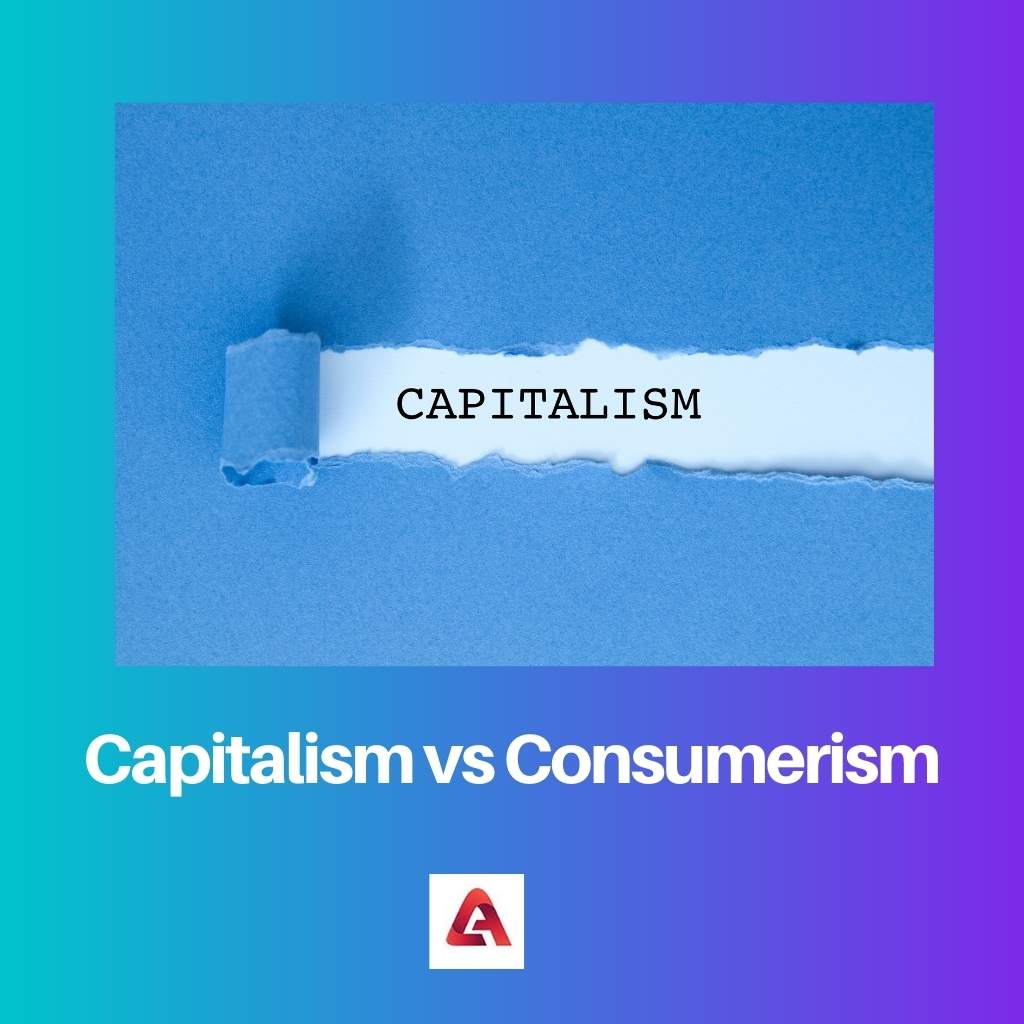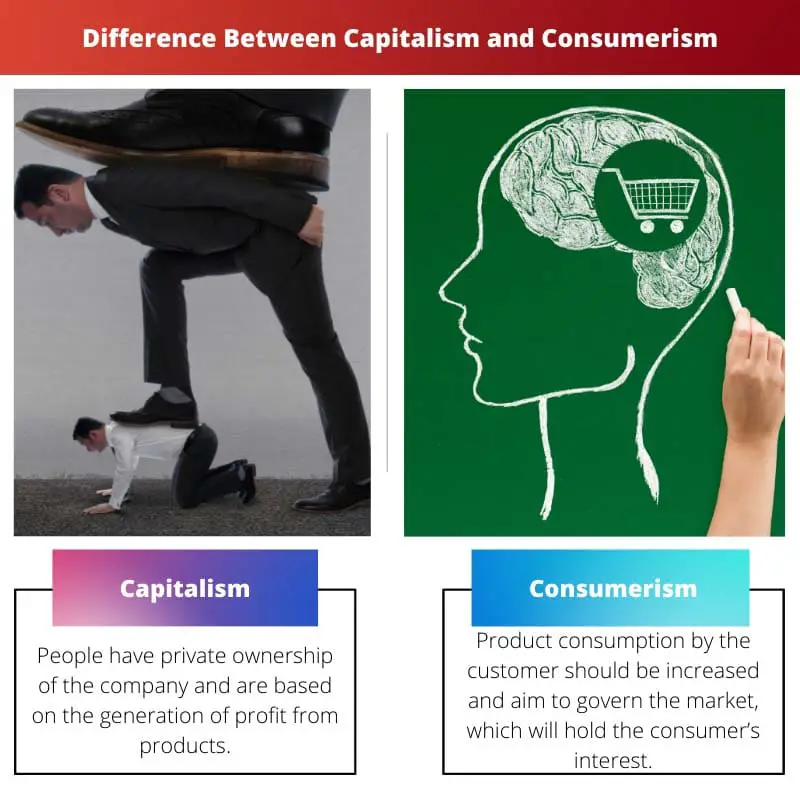The current Western society is characterized by a capitalist economic structure which is based on an economy driven by profit and ownership of private properties.
As a result of the same, the emergence of a small number of super-rich people is seen stratifying the Western economic reforms in society.
In a profit-driven economy, businesses and companies are encouraged to manipulate the market for the sale of profits of the venture. As a result of Capitalism‘s marketing tactics, the customers benefit from individual consumption while capitalists profit from the monetary gains.
Key Takeaways
- Capitalism is an economic system that emphasizes private ownership of the means of production and the creation of goods and services for profit. At the same time, consumerism is a social and economic order that encourages the acquisition of goods and services in ever-increasing amounts.
- Capitalism values the accumulation of wealth and the pursuit of profit, while consumerism values the acquisition of goods and services for their own sake.
- Capitalism emphasizes the production of goods and services, while consumerism emphasizes the consumption of goods and services.
Capitalism vs Consumerism
Capitalism is an economic system in which private individuals and businesses own the means of production and distribution of goods and services. Consumerism is a social and economic phenomenon in which individuals and society as a whole place a high value on the consumption of goods and services.

Capitalism is an economic structure focused on the private ownership of productive assets and their profitable activities. It can be of two types.
A market economy is one where goods and services are produced solely based on demand and supply in the general market rather than by central planning, as in the case of a planned or command economy.
Consumerism is the belief that increasing one’s consumption of products and services purchased on the market is a positive aim to make the customers buy the products. Customer satisfaction is inextricably important and connected to the ability to acquire consumer goods.
Consumption here acts as a positive phenomenon that promotes economic development by encouraging the consumers to spend money on the product.
Comparison Table
| Parameters of Comparison | Capitalism | Consumerism |
|---|---|---|
| Meaning | People have private ownership of the company and are based on the generation of profit from products. | Product consumption by the customer should be increased and aim to govern the market, which will hold the consumer’s interest. |
| Principle | Private ownership, free markets, profit-driven. | Increases goods consumption by promoting the customers to buy the products. |
| Types | 2 types: Market economy and planned economy. | 4 types: Routine purchases, Limited decision-making purchases, More decision-making purchases, and Consumer impulse buying. |
| Advantages | Enhances innovation; incentives provided; prevents government interference. | Choice of the product; Self-satisfaction; Maintenance of economic status. |
| Disadvantages | Gaining a monopoly leads to deterioration of other markets, environmental damage; prone to economic boom and bust. | It isn’t eco-friendly; differentiated products for different economic classes; price variations of products. |
What is Capitalism?
The main motive in Capitalism is the generation of profit, as it serves as the driving force behind employers and employees taking new measures that contribute to the success of the company or the business.
Due to the predominance of the profit motive, the prices of commodities are automatically altered by prices provided by manufacturers and the choice of the customer.
Consumers strongly control the types and quantities of products to be manufactured and produced in order to make the products accessible to the customers.
Consumers can buy the products according to their needs and choices. Producers are entitled to manufacture a wide range of products in order to meet the needs of the market while maintaining the profit generated by the product.
Because Capitalism gives buyers and sellers absolute freedom, the capitalist market has a large number of buyers and sellers.
Continuous competition for the production of goods, their cost, distribution, and consumption of a good are present in the capital market. Capitalism has a free market, motive for profit, individual rights, and the state’s limited intervention in production and consumption.
This provides consumerism with a suitable environment for its growth.

What is Consumerism?
Consumerism is a philosophy that encourages people to acquire and consume as much as possible. It promotes producers to manufacture the products based on consumers’ free choice.
This also guides the programs and economic policies of the government. It motivates customers to pursue a comfortable life despite the social and moral implications posed to them.
Consumption has increased rapidly since the last century after consumerism came into play.
Market product availability following the industrial revolution increased, and the departmental stores offered a wide range of products at a single location which sparked the habit of shopping, making it easy and comfortable.
Many of the elements of the capitalist economic system, such as mass production, lower prices, and assembly line, led to the increase in consumption of the product.
The rise in consumerism paralleled Capitalism’s rise. Completion for the industry, profit motive, and the technological efficiency increment contributed to economic growth leading to the promotion of customer culture.
The maximum focus on consumption in consumerism has negative implications. Purchasing and consuming things in excess of one’s needs fosters a greedy mentality and lead to an undisciplined lifestyle. It makes people imply that economic growth is the most superior in life.

Main Differences Between Capitalism and Consumerism
- Capitalism provides a free market where the government holds almost no power while the government plays an active role in consumerism.
- Capitalism is profit-based, while consumerism is based on the consumer market.
- Capitalism gives the owner full-fledged private ownership, while consumerism doesn’t allow private ownership of the company.
- Capitalism is of two types (Market economy and Planned economy), while consumerism is of four types (Routine purchases, Limited decision-making purchases, More decision-making purchases, and Consumer impulse buying).
- Capitalism promotes innovation as the competition in the market is very high, while consumerism has comparatively less competition.





